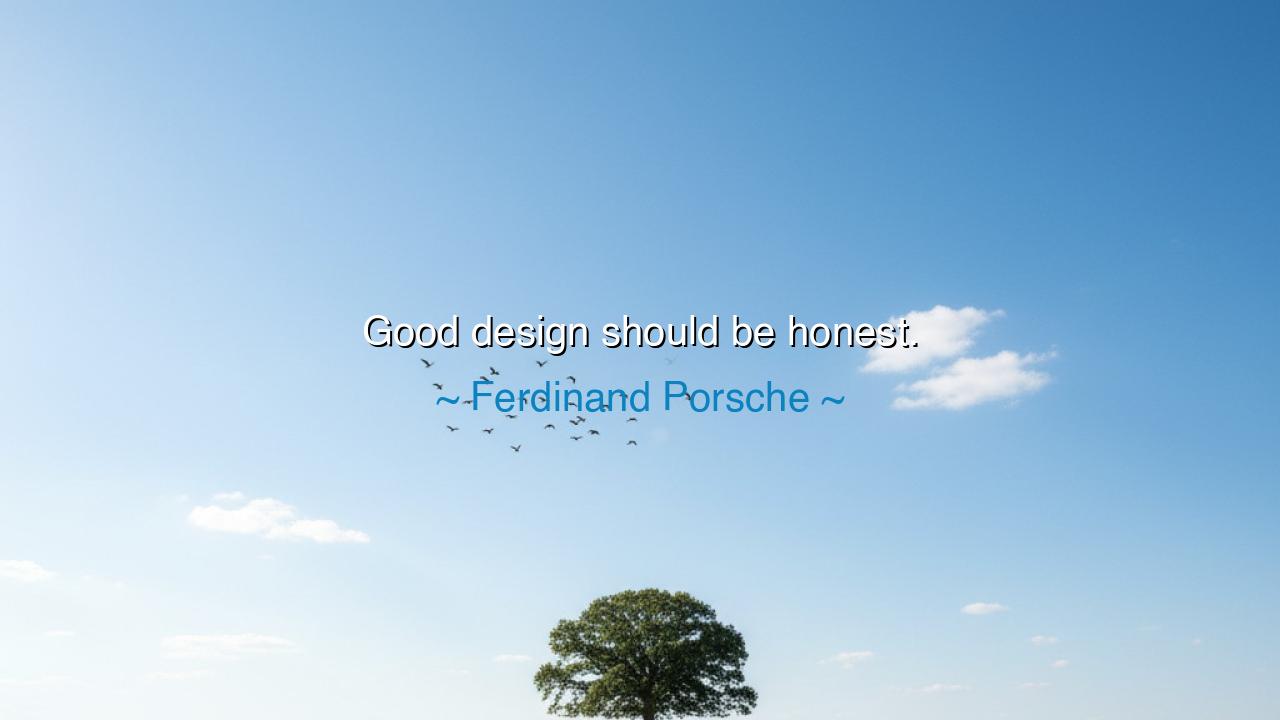
Good design should be honest.






In the enduring words of Ferdinand Porsche, the legendary engineer and visionary of design, we find a truth that transcends machines and enters the realm of philosophy: “Good design should be honest.” These few words carry the gravity of centuries of craft, the echo of builders, sculptors, and thinkers who sought not merely to create, but to reveal truth through form. In this simple statement lies a moral code for creators of every age—a declaration that beauty without integrity is hollow, and that design, whether of a car, a home, or a life, must arise from sincerity of purpose rather than the deceit of ornament.
To understand the origin of this quote, one must first understand the man. Ferdinand Porsche, the creator of the timeless Porsche 911, was not only a designer of automobiles; he was a craftsman of principle. He believed that form must follow function, that every curve and contour should serve the spirit of performance and efficiency. For him, honesty in design meant that nothing was superfluous, nothing false—no line without reason, no detail without purpose. His cars, sleek yet purposeful, were not designed to impress but to endure. In his workshop, truth was not written in words, but in the language of steel, movement, and proportion.
“Good design should be honest,” he said—and these words speak as if drawn from the wisdom of the ancients, who saw truth and beauty as one and the same. Consider the Parthenon of Athens, whose every column was built not to deceive the eye, but to align with the laws of balance and harmony. Its architects did not hide imperfection behind false facades; they corrected them through understanding and skill. The building stands after millennia because it was conceived not in vanity, but in truth. So it is with all lasting design—whether a bridge that spans centuries or a melody that outlives its composer—each is honest to its purpose, and in that honesty lies its immortality.
Yet how often, in our modern age, do we see design that lies? There are creations that seduce the eye but fail the soul—objects that mimic beauty while concealing fragility. The world today is filled with false design, built for appearances rather than essence. A building adorned with glass and chrome may shine like a jewel, yet crumble in meaning because it hides its structure behind fashion. A product may boast of innovation, yet exist only to flatter desire. Such works betray not only art, but humanity itself, for dishonesty in design is dishonesty toward those who must live with it. Porsche warned us of this danger: that when creation loses sincerity, civilization loses depth.
The story of Brunelleschi, the architect of Florence’s great cathedral dome, offers a living mirror to Porsche’s philosophy. When faced with the impossible task of spanning the vast cathedral without supports, Brunelleschi refused deceit or shortcuts. He studied geometry, crafted tools, and labored through pure ingenuity to solve the problem honestly. His dome still crowns the city, a testament not merely to beauty, but to truth made visible. Like Porsche, he understood that real mastery lies not in illusion, but in integrity—that when one creates with honesty, the work stands forever, even if the creator does not.
To be honest in design is to let truth shape form. It is to allow the material to speak, the function to guide, and the creator’s hand to serve rather than dominate. An honest design does not scream—it whispers with confidence, revealing its strength through simplicity. It does not hide flaws but resolves them. It does not chase fashion but seeks timelessness. Such honesty requires humility—the courage to listen to the nature of the task, to the laws of balance, to the needs of those who will use what you build. For the ancient craftsman and the modern designer alike, this is the sacred path: the pursuit of beauty through truth.
And so, the lesson of Porsche’s words is not limited to design alone—it belongs to all creation, even to the crafting of one’s own character. Let your life, too, be an honest design. Do not decorate your soul with false virtues or hollow gestures; build it upon purpose and authenticity. Let your words serve your deeds, and your deeds reveal your heart. The honest life, like the honest design, will outlast every imitation.
Thus, my child, remember this: honesty is the soul of creation. When you make, build with integrity; when you speak, let truth shape your tone; when you live, let purpose be your design. For all that is false fades with time, but what is honest endures—like the gleam of a well-forged wheel, like the harmony of a dome, like the eternal perfection of a simple, truthful line.






AAdministratorAdministrator
Welcome, honored guests. Please leave a comment, we will respond soon